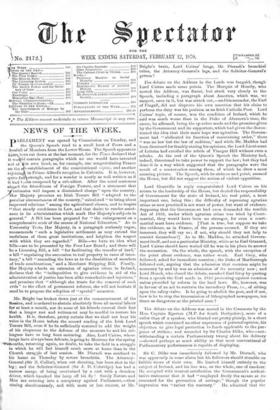The debate on the Address in the Lords was languid,
though' Lord Cairns made some points. The Marquis of Huntly, who moved the Address, was fluent, but stuck very closely to the Speech, including a paragraph about America, which was, we suspect, once in it, but was struck out,—and his seconder, the Earl of Fingall, did not disprove his own assertion that his claim to perform the duty was his position as an Irish Catholic Peer. Lord Cairns' topic, of course, was the condition of Ireland, which he said was much worse than in the Duke of Abercorn's time, the cause, be affirmed, being the speeches made and the promises given by the Government and its supporters, which had given the discon- tented the idea that their main hope was agitation. The Govern- ment had " abdicated its function of maintaining order," there " was no law but the law of sedition," and while Mr. Madden had been dismissed for frankly stating his opinions, the Lord-Lieutenant of Leitrim had extolled the rebels of Vinegar Hill without even a rebuke. At the end of the Queen's Speech the Ministry had, indeed, threatened to take power to support the law; but they had done it in a way which suggested that the paragraphs were the result of a conversation among them, of which he drew a most amusing picture. The Speech, with its airiness and point, amused the House, but did not suggest the notion of violent opposition.


































